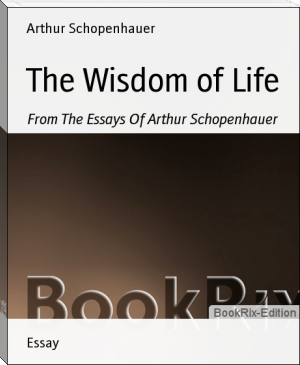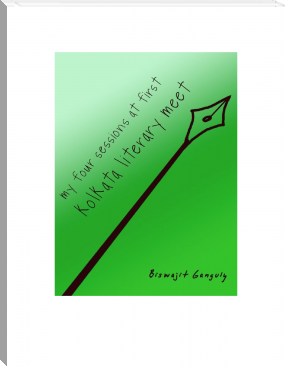The Art of Controversy, Arthur Schopenhauer [ready player one ebook .txt] 📗

- Author: Arthur Schopenhauer
Book online «The Art of Controversy, Arthur Schopenhauer [ready player one ebook .txt] 📗». Author Arthur Schopenhauer
matter are cast aside, and the pure spirit - the pure, knowing subject - remains. Hence, if a man has any genius, let him guard himself from pain, keep care at a distance, and limit his desires; but those of them which he cannot suppress let him satisfy to the full. This is the only way in which he will make the best use of his rare existence, to his own pleasure and the world's profit.
To fight with need and care or desires, the satisfaction of which is refused and forbidden, is good enough work for those who, were they free of would have to fight with boredom, and so take to bad practices; but not for the man whose time, if well used, will bear fruit for centuries to come. As Diderot says, he is not merely a moral being.
Mechanical laws do not apply in the sphere of chemistry, nor do chemical laws in the sphere in which organic life is kindled. In the same way, the rules which avail for ordinary men will not do for the exceptions, nor will their pleasures either.
It is a persistent, uninterrupted activity that constitutes the superior mind. The object to which this activity is directed is a matter of subordinate importance; it has no essential bearing on the superiority in question, but only on the individual who possesses it. All that education can do is to determine the direction which this activity shall take; and that is the reason why a man's nature is so much more important than his education. For education is to natural faculty what a wax nose is to a real one; or what the moon and the planets are to the sun. In virtue of his education a man says, not what he thinks himself, but what others have thought and he has learned as a matter of training; and what he does is not what he wants, but what he has been accustomed to do.
The lower animals perform many intelligent functions much better than man; for instance, the finding of their way back to the place from which they came, the recognition of individuals, and so on. In the same way, there are many occasions in real life to which the genius is incomparably less equal and fitted than the ordinary man. Nay more: just as animals never commit a folly in the strict sense of the word, so the average man is not exposed to folly in the same degree as the genius.
The average man is wholly relegated to the sphere of being ; the genius, on the other hand, lives and moves chiefly in the sphere of
knowledge . This gives rise to a twofold distinction. In the first place, a man can be one thing only, but he may know countless things, and thereby, to some extent, identify himself with them, by participating in what Spinoza calls their esse objectivum . In the second place, the world, as I have elsewhere observed, is fine enough in appearance, but in reality dreadful; for torment is the condition of all life.
It follows from the first of these distinctions that the life of the average man is essentially one of the greatest boredom; and thus we see the rich warring against boredom with as much effort and as little respite as fall to the poor in their struggle with need and adversity. And from the second of them it follows that the life of the average man is overspread with a dull, turbid, uniform gravity; whilst the brow of genius glows with mirth of a unique character, which, although he has sorrows of his own more poignant than those of the average man, nevertheless breaks out afresh, like the sun through clouds. It is when the genius is overtaken by an affliction which affects others as well as himself, that this quality in him is most in evidence; for then he is seen to be like man, who alone can laugh, in comparison with the beast of the field, which lives out its life grave and dull.
It is the curse of the genius that in the same measure in which others think him great and worthy of admiration, he thinks them small and miserable creatures. His whole life long he has to suppress this opinion; and, as a rule, they suppress theirs as well. Meanwhile, he is condemned to live in a bleak world, where he meets no equal, as it were an island where there are no inhabitants but monkeys and parrots. Moreover, he is always troubled by the illusion that from a distance a monkey looks like a man.
Vulgar people take a huge delight in the faults and follies of great men; and great men are equally annoyed at being thus reminded of their kinship with them.
The real dignity of a man of genius or great intellect, the trait which raises him over others and makes him worthy of respect, is at bottom the fact, that the only unsullied and innocent part of human nature, namely, the intellect, has the upper hand in him? and prevails; whereas, in the other there is nothing but sinful will, and just as much intellect as is requisite for guiding his steps, - - rarely any more, very often somewhat less, - and of what use is it?
It seems to me that genius might have its root in a certain perfection and vividness of the memory as it stretches back over the events of past life. For it is only by dint of memory, which makes our life in the strict sense a complete whole, that we attain a more profound and comprehensive understanding of it.
Imprint
To fight with need and care or desires, the satisfaction of which is refused and forbidden, is good enough work for those who, were they free of would have to fight with boredom, and so take to bad practices; but not for the man whose time, if well used, will bear fruit for centuries to come. As Diderot says, he is not merely a moral being.
Mechanical laws do not apply in the sphere of chemistry, nor do chemical laws in the sphere in which organic life is kindled. In the same way, the rules which avail for ordinary men will not do for the exceptions, nor will their pleasures either.
It is a persistent, uninterrupted activity that constitutes the superior mind. The object to which this activity is directed is a matter of subordinate importance; it has no essential bearing on the superiority in question, but only on the individual who possesses it. All that education can do is to determine the direction which this activity shall take; and that is the reason why a man's nature is so much more important than his education. For education is to natural faculty what a wax nose is to a real one; or what the moon and the planets are to the sun. In virtue of his education a man says, not what he thinks himself, but what others have thought and he has learned as a matter of training; and what he does is not what he wants, but what he has been accustomed to do.
The lower animals perform many intelligent functions much better than man; for instance, the finding of their way back to the place from which they came, the recognition of individuals, and so on. In the same way, there are many occasions in real life to which the genius is incomparably less equal and fitted than the ordinary man. Nay more: just as animals never commit a folly in the strict sense of the word, so the average man is not exposed to folly in the same degree as the genius.
The average man is wholly relegated to the sphere of being ; the genius, on the other hand, lives and moves chiefly in the sphere of
knowledge . This gives rise to a twofold distinction. In the first place, a man can be one thing only, but he may know countless things, and thereby, to some extent, identify himself with them, by participating in what Spinoza calls their esse objectivum . In the second place, the world, as I have elsewhere observed, is fine enough in appearance, but in reality dreadful; for torment is the condition of all life.
It follows from the first of these distinctions that the life of the average man is essentially one of the greatest boredom; and thus we see the rich warring against boredom with as much effort and as little respite as fall to the poor in their struggle with need and adversity. And from the second of them it follows that the life of the average man is overspread with a dull, turbid, uniform gravity; whilst the brow of genius glows with mirth of a unique character, which, although he has sorrows of his own more poignant than those of the average man, nevertheless breaks out afresh, like the sun through clouds. It is when the genius is overtaken by an affliction which affects others as well as himself, that this quality in him is most in evidence; for then he is seen to be like man, who alone can laugh, in comparison with the beast of the field, which lives out its life grave and dull.
It is the curse of the genius that in the same measure in which others think him great and worthy of admiration, he thinks them small and miserable creatures. His whole life long he has to suppress this opinion; and, as a rule, they suppress theirs as well. Meanwhile, he is condemned to live in a bleak world, where he meets no equal, as it were an island where there are no inhabitants but monkeys and parrots. Moreover, he is always troubled by the illusion that from a distance a monkey looks like a man.
Vulgar people take a huge delight in the faults and follies of great men; and great men are equally annoyed at being thus reminded of their kinship with them.
The real dignity of a man of genius or great intellect, the trait which raises him over others and makes him worthy of respect, is at bottom the fact, that the only unsullied and innocent part of human nature, namely, the intellect, has the upper hand in him? and prevails; whereas, in the other there is nothing but sinful will, and just as much intellect as is requisite for guiding his steps, - - rarely any more, very often somewhat less, - and of what use is it?
It seems to me that genius might have its root in a certain perfection and vividness of the memory as it stretches back over the events of past life. For it is only by dint of memory, which makes our life in the strict sense a complete whole, that we attain a more profound and comprehensive understanding of it.
Imprint
Publication Date: 05-21-2008
All Rights Reserved
Free e-book «The Art of Controversy, Arthur Schopenhauer [ready player one ebook .txt] 📗» - read online now
Similar e-books:





Comments (0)